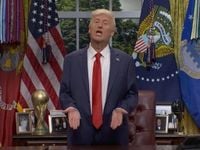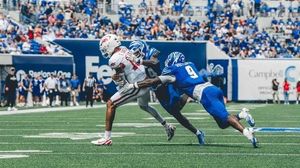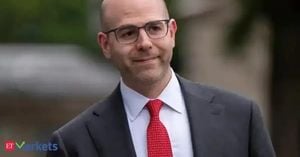In a striking blend of humor and controversy, former President Donald Trump recently shared an AI-generated image of himself dressed as the pope on his social media platform, Truth Social. This post comes shortly after the death of Pope Francis, raising eyebrows and sparking outrage among many, particularly within the Catholic community.
The image was shared by Trump and the White House just over a week after Trump attended Pope Francis' funeral on April 26, 2025. Following the post, Trump jokingly claimed during a press briefing, "I'd like to be pope; that would be my number one choice." His comments and the image have been met with a mix of mockery and condemnation, with critics arguing that the timing and nature of the post were disrespectful.
Colin Jost, a star of "Saturday Night Live," wasted no time in skewering the image during the show's "Weekend Update" segment. He quipped, "Who posts a photo of themselves dressed like a guy who died a week ago?" Jost continued, suggesting that Trump appeared to be "ordering a one-way ticket to hell" with his post. The comedic take highlighted the absurdity of the situation while also addressing the serious implications of such a gesture.
In response to the backlash, Trump distanced himself from the AI-generated image, stating, "I had nothing to do with it. Somebody made up a picture of me dressed like the pope, and they put it out on the internet. That’s not me that did it, I have no idea where it came from — maybe it was A.I." Despite his denial, the image was indeed shared from his official accounts, prompting questions about accountability and intent.
Cardinal Timothy M. Dolan of New York, who was in Rome for the papal conclave, expressed hope that Trump was not involved in the creation of the image. He referred to it as a "brutta figura," meaning it made a bad impression, underscoring the offense taken by many within the Catholic Church. Dolan's comments reflect a broader sentiment among Catholics who feel that the post trivializes the papacy.
Moreover, Dennis Poust, the executive director of the New York State Catholic Conference, stated, "It’s never appropriate to ridicule or mock the papacy." This sentiment resonates with many who believe that the sacred nature of religious symbols should be respected, especially in the wake of mourning a beloved leader like Pope Francis.
Trump's humor, often seen as a tool to connect with his base, has drawn criticism for crossing lines that many believe should remain intact. His penchant for defilement—disrupting societal norms and values—has become a hallmark of his public persona. This tactic, as some commentators suggest, serves to reinforce a cult-like dynamic among his followers, who often overlook or excuse his more outrageous statements and actions.
In the political arena, the fallout from the image continues to unfold. Republicans in the Senate Judiciary Committee have recently stopped responding to Democrats regarding critical issues, such as the deportation of U.S. citizens without due process. This silence raises questions about the state of political discourse in a country where Trump remains a powerful figure.
In a related development, Vice President JD Vance, who converted to Catholicism under the influence of Peter Thiel, defended Trump’s humor on social media. When asked by conservative commentator Bill Kristol if he was comfortable with the disrespect shown to the Holy Father, Vance replied, "As a general rule, I'm fine with people telling jokes and not fine with people starting stupid wars that kill thousands of my countrymen." This response highlights the complex interplay between humor, politics, and faith within the current Republican landscape.
As the papal conclave convenes to elect a new successor to Pope Francis, the implications of Trump's actions linger. The former president's self-portrayal as a potential pope may serve as a commentary on his desire for power and influence, blurring the lines between politics and religion in a way that many find troubling.
Critics argue that Trump's latest stunt is not merely a humorous jab but a deeper commentary on his view of authority and governance. By appropriating the image of the pope, Trump seems to assert dominance over traditional values, challenging the very fabric of what many consider sacred. This behavior raises concerns about the normalization of subversion and corruption in political discourse.
The ongoing cultural and political turmoil surrounding Trump reflects a broader trend of disillusionment among voters. As many grapple with the implications of his presidency and ongoing influence, the need for critical engagement with such issues becomes increasingly apparent. The satire and criticism aimed at Trump's actions serve as a reminder of the importance of holding public figures accountable for their words and deeds.
In summary, Trump's AI-generated image as the pope has ignited a firestorm of debate, revealing the complexities of humor, faith, and politics in contemporary America. As the nation watches the unfolding events surrounding the papal conclave and the reactions from both supporters and detractors, the impact of this incident will likely resonate far beyond the immediate controversy.




